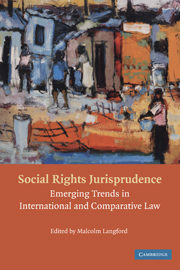Book contents
- Frontmatter
- Contents
- Foreword – Philip Alston
- Preface
- PART ONE OVERVIEW
- PART TWO SELECT NATIONAL JURISDICTIONS
- 4 South Africa
- 5 India
- 6 South Asia
- 7 Colombia
- 8 Argentina
- 9 Brazil
- 10 Venezuela
- 11 Canada
- 12 The United States
- 13 Hungary
- 14 France
- 15 United Kingdom
- 16 Ireland
- PART THREE REGIONAL PROCEDURES AND JURISPRUDENCE
- PART FOUR INTERNATIONAL HUMAN RIGHTS PROCEDURES AND JURISPRUDENCE
- PART FIVE SPECIAL TOPICS
- Notes on Contributors
- Table of Authorities
- Index
- References
6 - South Asia
Economic and Social Rights Case Law of Bangladesh, Nepal, Pakistan and Sri Lanka
Published online by Cambridge University Press: 05 June 2012
- Frontmatter
- Contents
- Foreword – Philip Alston
- Preface
- PART ONE OVERVIEW
- PART TWO SELECT NATIONAL JURISDICTIONS
- 4 South Africa
- 5 India
- 6 South Asia
- 7 Colombia
- 8 Argentina
- 9 Brazil
- 10 Venezuela
- 11 Canada
- 12 The United States
- 13 Hungary
- 14 France
- 15 United Kingdom
- 16 Ireland
- PART THREE REGIONAL PROCEDURES AND JURISPRUDENCE
- PART FOUR INTERNATIONAL HUMAN RIGHTS PROCEDURES AND JURISPRUDENCE
- PART FIVE SPECIAL TOPICS
- Notes on Contributors
- Table of Authorities
- Index
- References
Summary
INTRODUCTION
This chapter sets out a non-exhaustive survey of four key South Asian jurisdictions – Bangladesh, Nepal, Pakistan and Sri Lanka. In doing so, it reveals the development by courts in each country of a rich and fertile seam of law that has contributed over two decades to advancing the recognition of economic and social rights (ESRs) not merely in the region, but globally.
While many working on ESRs both inside and outside the region are increasingly familiar with the decisions of the Indian Supreme Court, they appear less so with the judgments handed down by courts in the other countries within South Asia, which are largely based on each country's particular constitutional and statutory arrangements and socio-economic and cultural contexts.
With the exception of Bhutan and Nepal, all of the South Asian countries were colonised by the British Empire (subsequently becoming members of the Commonwealth) and adopted the common law system with some variations (especially Sri Lanka). All the countries apply personal status laws based on religion, which vary depending on the community concerned, to determine rights within the family. All have similar court systems, with superior courts adjudicating on fundamental rights claims and with the Supreme Court hearing constitutional writ petitions directly (India, Nepal, Sri Lanka) or on appeal from High Courts (Bangladesh, Pakistan), which have original jurisdiction to do so.
- Type
- Chapter
- Information
- Social Rights JurisprudenceEmerging Trends in International and Comparative Law, pp. 125 - 143Publisher: Cambridge University PressPrint publication year: 2009
References
- 1
- Cited by



